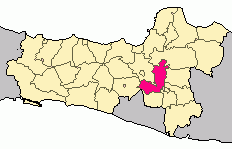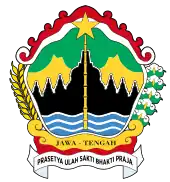Boyolali Regency
Kabupaten Boyolali | |
|---|---|
 Coat of arms | |
| Nickname: Kota Susu
(Milk City) | |
| Motto: Boyolali Tersenyum
(Don't Forget to Smile) | |
 Location of Boyolali Regency in Central Java | |
| Coordinates: 7°31′56″S 110°36′9″E / 7.53222°S 110.60250°E | |
| Country | Indonesia |
| Province | Central Java |
| Capital | Boyolali |
| Area | |
| • Total | 1,080.93 km2 (417.35 sq mi) |
| Population (mid 2022 estimate) | |
| • Total | 1,079,952 |
| • Density | 1,000/km2 (2,600/sq mi) |
| [1] | |
| Time zone | UTC+7 (WIB) |
| Area code | +62 276 |
| Website | boyolali |
Boyolali (Javanese: ꦧꦺꦴꦪꦭꦭꦶ, romanized: Boyalali, lit. 'Don't forget') is a regency (Indonesian: kabupaten) in the eastern part of Central Java province in Indonesia. It covers an area of 1,080.93 km2, and had a population of 930,531 at the 2010 census[2] and 1,062,713 at the 2020 census;[3] the official estimate as at mid 2022 was 1,079,952, comprising 543,113 males and 536,839 females.[1]
History
The anniversary of the founding of Boyolali is celebrated on June 5, as the government of Kasunanan Surakarta created a new rule about the village government or the government outside the Kuthanegara (Capital City) on 5 June 1847. The rule was adopted pursuant to the treaty of Serat Perjanjian Dalem Natha entered into between Pakubuwono VII and the Dutch Government in the belief that the incumbent government was unable to fully function. The treaty is in the treaty of Serat Perjanjian Dalem Natha page 140 – 146 or in Staatsblad 1847 No. 30. Chapter 30 – 36. According to Staatsblad in 1847 No.30, the Government of Kasunanan Surakarta formed six "Mountain Regencies" in its surrounding area to help the government in those regions. The six regions were the City of Surakarta and the Regencies of Kartosuro, Klaten, Boyolali, Ampel and Sragen. (Pawarti Surakarta, 1939:71). Based on that Staatsblad later on known as the anniversary of the regency Boyolali was 5 June 1847.[4]
Geography and Climate
Geography
The town of Boyolali is the administrative centre of the regency, also named Boyolali; it lies 27 km to the west of Surakarta. The regency covers an area of approximately 1,080.93 km2, with the highest point being Mount Merbabu - 3,141 m.
Boyolali is located at the east foothill of Mount Merapi and Mount Merbabu, which has very beautiful and charming scenery, the spacious greens and hilly area around the volcanic activity of Merapi provides enchanting opportunities for sightseeing.
Boyolali also has tourist attractions in the form of a natural spring that flows continuously and very clearly, as well as water attractions, swimming pool, fishing pond and restaurants like the Tlatar (about 7 km north Boyolali city) and in District Pengging Banyudono (about 10 km east of the town of Boyolali).[5]
Climate
Boyolali has a tropical monsoon climate (Am) according to Köppen climate classification. Average temperature varies little from month to month. October is warmest with an average temperature of 25.2 °C. July is coldest with an average temperature of 23.7 °C. The wet season has a rainfall peak around March. The dry season centers around the month of August, which has the most sunshine.
| Climate data for Boyolali | |||||||||||||
|---|---|---|---|---|---|---|---|---|---|---|---|---|---|
| Month | Jan | Feb | Mar | Apr | May | Jun | Jul | Aug | Sep | Oct | Nov | Dec | Year |
| Mean daily maximum °C (°F) | 27.8 (82.0) |
28.0 (82.4) |
28.3 (82.9) |
29.2 (84.6) |
29.1 (84.4) |
29.2 (84.6) |
28.9 (84.0) |
29.6 (85.3) |
30.1 (86.2) |
30.3 (86.5) |
29.2 (84.6) |
28.5 (83.3) |
29.0 (84.2) |
| Daily mean °C (°F) | 24.0 (75.2) |
24.2 (75.6) |
24.3 (75.7) |
24.8 (76.6) |
24.7 (76.5) |
24.2 (75.6) |
23.7 (74.7) |
24.0 (75.2) |
24.8 (76.6) |
25.2 (77.4) |
24.8 (76.6) |
24.4 (75.9) |
24.4 (76.0) |
| Mean daily minimum °C (°F) | 20.3 (68.5) |
20.4 (68.7) |
20.4 (68.7) |
20.5 (68.9) |
20.3 (68.5) |
19.3 (66.7) |
18.5 (65.3) |
18.5 (65.3) |
19.5 (67.1) |
20.2 (68.4) |
20.4 (68.7) |
20.3 (68.5) |
19.9 (67.8) |
| Average rainfall mm (inches) | 350 (13.8) |
333 (13.1) |
357 (14.1) |
269 (10.6) |
182 (7.2) |
100 (3.9) |
57 (2.2) |
46 (1.8) |
54 (2.1) |
132 (5.2) |
255 (10.0) |
313 (12.3) |
2,448 (96.3) |
| Source: Climate-Data.org[6] | |||||||||||||
Places of interest
- Mount Merapi, the most active volcano in Indonesia. Can be reached through Selo district.
- Umbul Tlatar, natural spring pool located 7 km to the north of Boyolali.
- Umbul Pengging, natural spring pool at Banyudono district.
- Kedung Ombo Dam, mainly used for irrigation purposes.
- Woodball Course Tlatar, Woodball Arena inside Umbul Tlatar area.[7]
Adjacent areas
Boyolali Regency is surrounded by other regencies: Klaten Regency and Yogyakarta province in the south; Sukoharjo, Karanganyar and Sragen regencies and Solo city in the east; Semarang Regency and Grobogan Regency in the north; and Magelang Regency in the west.
Administrative districts
At the time of the 2010 census, Boyolali Regency comprised nineteen districts (kecamatan), but subsequently three additional districts (Gladagsari, Tamansari and Wonosamodro) were created by splitting off parts of existing districts. The twenty-two districts are tabulated below with their areas and their populations at the 2010 census[2] and the 2020 census,[3] together with the official estimates as at mid 2022.[1] The table also gives the location of the district administrative centres, the number of villages in each district (totaling 261 rural desa and 6 urban kelurahan), and the district post codes.
| Kode Wilayah | Name of District (kecamatan) | Area in km2 | Pop'n 2010 census | Pop'n 2020 census | Pop'n mid 2022 estimate | Admin centre | No. of villages | Post codes |
|---|---|---|---|---|---|---|---|---|
| 33.09.01 | Selo | 60.26 | 28,407 | 30,052 | 30,108 | Samiran | 10 | 57363 |
| 33.09.02 | Ampel | 31.49 | 75,664 | 40,796 | 40,429 | Candi | 10 | 57352 (a) |
| 33.09.20 | Gladagsari | 62.72 | (b) | 42,634 | 43,037 | Gladagsari | 10 | 57352 |
| 33.09.03 | Cepogo | 55.12 | 54,303 | 60,083 | 60,720 | Mliwis | 15 | 57362 |
| 33.09.04 | Musuk | 35.69 | 54,859 | 32,039 | 32,440 | Musuk | 10 | 57331 |
| 33.09.21 | Tamansari | 43.64 | (c) | 28,923 | 29,220 | Karangkendal | 10 | 57331 |
| 33.09.05 | Boyolali (town) | 29.68 | 65,860 | 72,948 | 73,736 | Banaran | 9 (d) | 57311 - 57316 |
| 33.09.06 | Mojosongo | 45.54 | 50,606 | 59,356 | 60,666 | Mojosongo | 13 (e) | 57321 -57323 |
| 33.09.07 | Teras | 31.49 | 43,020 | 51,486 | 52,828 | Mojolegi | 13 | 57372 |
| 33.09.08 | Sawit | 18.52 | 29,733 | 32,280 | 32,503 | Kemasan | 12 | 57374 |
| 33.09.09 | Banyudono | 27.23 | 47,590 | 53,088 | 53,736 | Jembungan | 15 | 57373 |
| 33.09.10 | Sambi | 50.35 | 41,328 | 47,311 | 48,129 | Sambi | 16 | 57376 |
| 33.09.11 | Ngemplak | 40.63 | 81,211 | 96,254 | 98,576 | Sawahan | 12 | 57375 |
| 33.09.12 | Nogosari | 55.65 | 63,287 | 72,409 | 73,652 | Glonggong | 13 | 57378 |
| 33.09.13 | Simo | 51.31 | 44,070 | 49,740 | 50,461 | Simo | 13 | 57377 |
| 33.09.14 | Karanggede | 46.74 | 37,723 | 45,870 | 47,211 | Kebonan | 16 | 57381 (f) |
| 33.09.15 | Klego | 56.30 | 39,296 | 47,773 | 49,168 | Klego | 13 | 57385 |
| 33.09.16 | Andong | 56.21 | 53,570 | 61,023 | 62,018 | Kacangan | 16 | 57384 |
| 33.09.17 | Kemusu | 67.83 | 39,306 | 34,456 | 34,943 | Klewar | 10 | 57383 |
| 33.09.18 | Wonosegoro | 57.52 | 49,076 | 38,274 | 39,124 | Wonosegoro | 11 | 57382 |
| 33.09.22 | Wonosamodro | 60.71 | (g) | 30,606 | 31,497 | Garangan | 10 | 57382 |
| 33.09.19 | Juwangi | 96.30 | 31,622 | 35,312 | 35,750 | Juwangi | 10 (h) | 57391 |
| Totals | 1,080.93 | 930,531 | 1,062,713 | 1,079,952 | Boyolali | 267 |
Notes: (a) except the desa of Sidomulyo (which has a post code of 57316). (b) the 2010 population is included with the figure for Ampel District, from which the western part was cut out.
(c) the 2010 population is included with the figure for Musuk District, from which the southern part was cut out.
(d) including 3 kelurahan - Banaran, Pulisen and Siswodipuran. (e) including 2 kelurahan - Mojosongo and Kemiri.
(f) except the desa of Tegalsari (which has a post code of 57311). (g) the 2010 population is included with the figure for Wonosegoro District, from which the western part was cut out;
the same alteration also moved part of Kemusu District into Wonosegoro District. (h) including one kelurahan - Sambeng.
Transportation
- Intercity buses
- Dokar, two-wheel carriage powered by horse
- Pedicab (Indonesian: Becak)
- Angkota, minibus
References
- 1 2 3 Badan Pusat Statistik, Jakarta, 2023, Kabupaten Boyolali Dalam Angka 2023 (Katalog-BPS 1102001.3309)
- 1 2 Biro Pusat Statistik, Jakarta, 2011.
- 1 2 Badan Pusat Statistik, Jakarta, 2021.
- ↑ "Sejarah Boyolali". www.boyolali.go.id. 23 October 2018. Archived from the original on 23 October 2018. Retrieved 23 October 2018.
- ↑ "Boyolali regency". windonesia-tourism.com. 22 October 2018. Retrieved 22 October 2018.
- ↑ "Climate: Boyolali". Climate-Data.org. Retrieved 14 November 2020.
- ↑ "Wips.com". Indotoplist.com. Archived from the original on 2012-04-25. Retrieved 2015-03-29.
External links
- (in Indonesian) Official website
